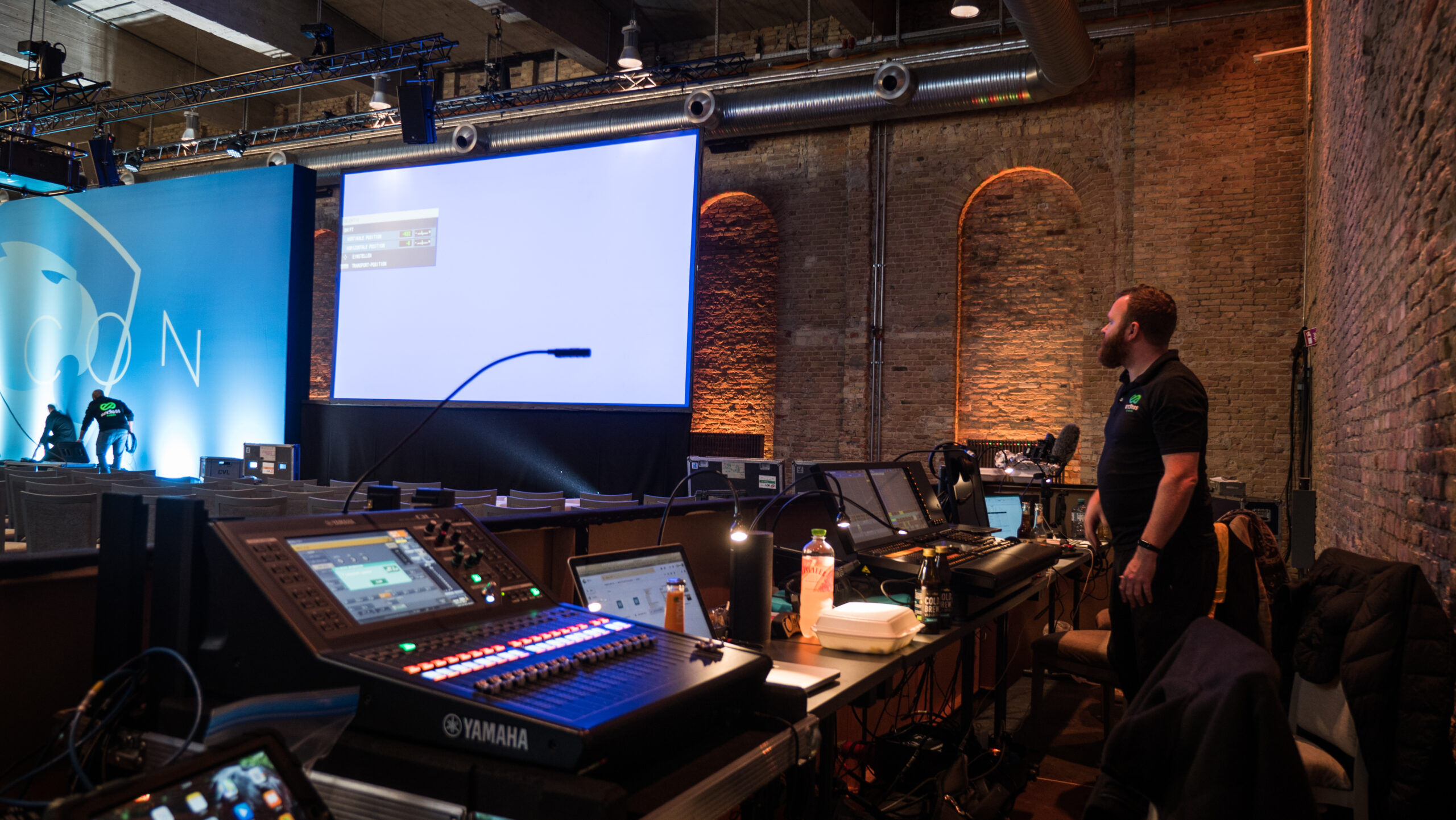Understanding Event Production: Why It Is Necessary for Successful Gatherings
Event production plays an essential duty in forming effective celebrations. It entails cautious planning, coordination, and implementation to guarantee every information lines up with the event's vision. This process not only boosts attendee experiences but likewise facilitates significant connections amongst participants. Understanding the details of event production can considerably affect the total outcome. What are the crucial elements that add to a successful event, and how can they be successfully handled?
The Role of Event Production in Creating Remarkable Experiences
Although several aspects add to the success of an occasion, event production plays a crucial function in crafting unforgettable experiences. This diverse procedure encompasses different elements, including preparation, logistics, and implementation. Efficient event production guarantees that every information lines up with the total vision, producing a smooth circulation that astounds attendees. By collaborating timelines, managing resources, and overseeing technological aspects, event manufacturers establish a structure for impactful experiences.Moreover, they curate settings that reverberate with the target market, boosting interaction and psychological connection. From picking ideal locations to integrating cutting-edge innovation, the choices made during production significantly influence just how guests perceive and bear in mind the event. By focusing on high quality and interest to detail, event production changes normal celebrations into amazing minutes, leaving long lasting perceptions. Inevitably, the experienced orchestration of these parts defines the significance of an occasion, showcasing the importance of specialist event production in achieving phenomenal end results.
Key Components of Successful Event Production
Efficient event production pivots on numerous key components that ensure success. Planning and coordination establish a strong structure, while technical arrangement demands attend to logistical demands. Furthermore, applying audience interaction strategies boosts the general experience, making the event unforgettable.
Planning and Coordination
Preparation and coordination serve as the foundation of effective event production, ensuring that every detail lines up perfectly to produce an unforgettable experience. Efficient planning involves developing a clear vision and purposes, while coordination involves the meticulous company of logistics, schedules, and resources. A well-defined timeline is vital, assisting all stakeholders with crucial turning points and tasks. Interaction plays a crucial function, fostering partnership amongst group participants, suppliers, and place personnel. Regular meetings and updates help to address difficulties immediately, making sure that everybody remains straightened with the event objectives. Ultimately, an organized method to planning and sychronisation not only boosts performance however also considerably contributes to the overall success and enjoyment of the event for participants and organizers alike.
Technical Setup Needs
An effective event relies greatly on its technical configuration needs, which incorporate essential parts such as audio-visual devices, lighting, staging, and connection. Audio-visual equipment consists of microphones, audio speakers, and projectors, ensuring that presentations and efficiencies are delivered clearly. Proper illumination improves the setting and highlights essential locations, while staging offers the necessary system for speakers and performers. Connectivity, including Wi-Fi and electric access, is essential for smooth interaction and innovation integration. Each part must be thoroughly intended and executed, tailored to the event's details needs. Poor technological configurations can lead to disruptions, negatively impacting the total experience for attendees, highlighting the importance of thorough preparation and focus to detail in event production.
Audience Interaction Methods

The Significance of Preparation and Control
Preparation and sychronisation are essential to the success of any event production. Effective timeline management, source allocation techniques, and team interaction characteristics play important duties in guaranteeing that all components collaborated flawlessly. Without a structured strategy to these aspects, events risk dealing with hold-ups, budget plan overruns, and miscommunication among staff member.
Effective Timeline Administration


While effective event production usually hinges on creative thinking and execution, efficient timeline management stays an essential aspect that can not be neglected. A well-structured timeline acts as the foundation of any type of event, making sure that each stage is carried out in a timely fashion. It enables the control of numerous jobs, from place arrangement to visitor arrivals, while protecting against potential traffic jams. By plainly outlining target dates and duties, event organizers can maintain focus and adapt to unexpected difficulties. Additionally, a carefully crafted timeline fosters interaction among group members, promoting liability and cooperation. Eventually, effective timeline monitoring not just boosts functional efficiency yet also adds greatly to the total success and smooth execution of the event, leaving participants with an unforgettable experience.
Source Allowance Approaches
Effective resource allocation methods are critical for the successful implementation of any kind of event. Appropriate planning allows event coordinators to recognize and disperse resources, such as finances, personnel, and products, in a manner that optimizes efficiency. By evaluating the specific demands of each facet of the event, coordinators can focus on jobs and designate resources appropriately. Control among different divisions makes certain that all components, from satisfying audiovisual requirements, are effectively sustained. This tactical approach not just minimizes waste but also boosts the total experience for attendees. Furthermore, anticipating possible obstacles and having backup plans in location permits smoother operations. Ultimately, efficient source allowance adds considerably to achieving event goals and assuring special info a memorable celebration.
Group Communication Characteristics
Just how can smooth communication among staff member transform the event production procedure? Reliable interaction is important for coordinating jobs, sharing updates, and attending to obstacles in real-time. When employee involve in open discussion, they can swiftly recognize potential issues and establish options collaboratively, lessening delays and misunderstandings. This vibrant fosters a natural environment where everyone understands their roles and responsibilities, resulting in a more synchronized effort. In addition, regular check-ins and responses loopholes enhance accountability and assurance positioning with the event's purposes. By focusing on interaction techniques, teams can enhance operations, strengthen morale, and eventually boost the total quality of the event. Successful events rest on the ability to communicate successfully, making it an important element of event production.
Enhancing Participant Involvement With Innovative Design
Creative design plays a crucial role in improving attendee involvement at events, as it fosters an immersive atmosphere that astounds individuals' attention. By integrating cutting-edge visuals, interactive elements, and thematic style, event planners can produce remarkable experiences that reverberate with guests. Thoughtful format designs advertise motion and exploration, motivating visitors to communicate with screens and each other.Incorporating modern technology, such as enhanced fact or live polling, further improves the experience, permitting for you can find out more real-time comments and communication. Additionally, sensory aspects like lighting, audio, and fragrance can evoke feelings and produce a more interesting atmosphere.The use narration with layout assists convey the event's objective and message, making it a lot more relatable for guests. Inevitably, creative design not just improves interaction however additionally grows links among participants, leaving an enduring perception that expands past the event itself. This tactical technique to layout is necessary for successful celebrations.
Handling Logistics for a Smooth Implementation
While the excitement of an event can draw attendees in, taking care of logistics is essential to safeguard a seamless execution. This entails meticulously working with different components, from location selection and layout to catering and transportation. Reliable logistics administration guarantees that all elements line up, enabling for a smooth circulation from registration to the conclusion of the event.Additionally, a clear interaction strategy amongst all stakeholders is important. This includes personnel, suppliers, and volunteers, who need to be notified of their functions and responsibilities. Preparing for possible challenges, such as tools failure or unanticipated weather, can further boost the event's success.Creating a detailed timeline assists keep the team on track and permits prompt changes. Ultimately, well-managed logistics not just help with a delightful experience for attendees yet likewise reflect the professionalism and reliability of the organizers, adding to the general success of the event.

The Impact of Innovation on Event Production
What duty does modern technology play in shaping contemporary event production? Innovation has become a foundation of efficient event production, boosting both planning and execution procedures. blog From innovative enrollment systems to interactive apps, innovation enhances attendee administration and improves involvement. Virtual event systems allow organizers to reach wider target markets, damaging geographical barriers and facilitating hybrid celebrations that combine in-person and online experiences.Additionally, audiovisual innovations, such as high-definition displays and sound systems, boost the high quality of discussions and performances, ensuring an unforgettable experience for attendees - event production charlotte. Social media combination allows real-time comments and interaction, fostering area engagement in the past, throughout, and after the event. Data analytics tools help organizers in keeping track of individual habits and choices, allowing customized experiences that resonate with varied target markets. On the whole, the combination of technology in event production not only boosts functional effectiveness yet additionally improves attendee experiences, inevitably contributing to the success of the event
Evaluating Success: Gauging the Results of Your Event
Success in event production hinges on effective evaluation, which involves gauging a variety of end results to evaluate the overall influence of an event. To accomplish this, coordinators can utilize both qualitative and quantitative metrics. Quantitative procedures might consist of attendance figures, ticket sales, and profits created, while qualitative assessments may involve guest fulfillment surveys and feedback forms.Additionally, evaluating social media sites involvement and media insurance coverage can offer insights right into the event's reach and brand name influence. Comparing these metrics versus predefined goals helps establish if the objectives were met.Furthermore, post-event debriefs with the preparation team can discover lessons learned and locations for renovation. By systematically reviewing these end results, event manufacturers can enhance future celebrations, making sure continuous development and success. Ultimately, a detailed assessment not only highlights achievements yet also informs strategic decisions for subsequent events, cultivating a society of excellence in event production.
Regularly Asked Questions
What Qualifications Should an Event Manufacturer Have?
Event producers should possess solid business abilities, creative thinking, and efficient interaction capabilities. A background in job management, budgeting, and arrangement is crucial. Appropriate accreditations and experience in diverse event types better improve their credentials.
How Can I Minimize Event Production Prices Properly?
To efficiently decrease event production costs, one can improve vendor selection, discuss agreements, make use of internal sources, prioritize vital components, carry out technology for effectiveness, and check out sponsorship chances to balance out costs without endangering top quality.
What Are the Usual Challenges in Event Production?
Typical obstacles in event production consist of budget plan restraints, logistical control, vendor management, time limitations, guest interaction, technological problems, and unanticipated conditions - event production charlotte. Each element can greatly influence the general success and smooth implementation of the event
Exactly how Do I Choose the Right Place for My Event?
Picking the appropriate venue involves thinking about factors such as area, ability, facilities, and budget. Furthermore, evaluating access and atmosphere ensures the selected room aligns with the event's objectives and enhances the total attendee experience.
What Is the Normal Timeline for Preparation an Occasion?
The regular timeline for intending an event varies, but generally includes phases such as principle advancement, venue selection, vendor control, promo, and last prep work, usually spanning a number of months to ensure a successful implementation.